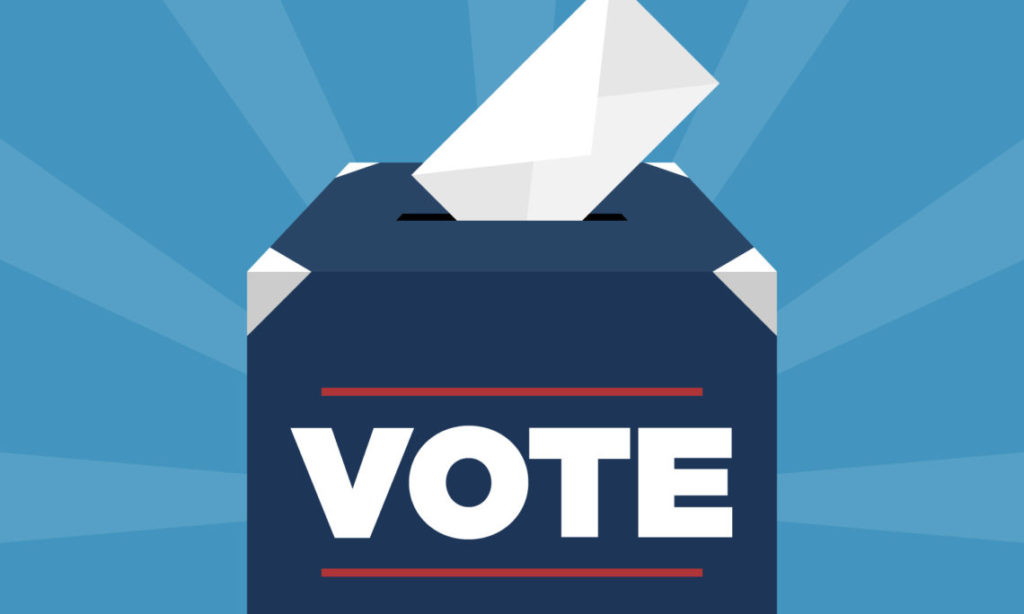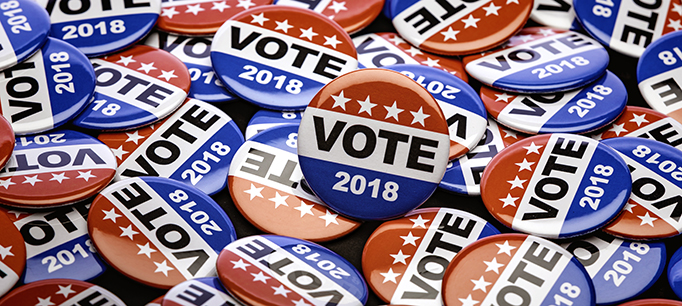
by Diane Proctor
[What follows is a brief distillation (supplemented by additional research) of a talk given by Edward Foley, of Ohio State, and Richard Hasen, at the Constitutional Law Center in Philadelphia, April 2020]
It’s a question of trust. And what we may face in November is an election crisis. There are frightening but realistic scenarios where the voters do everything right but find themselves legally disenfranchised.
Over the past three and one-half years we have come to know there is little that can be taken as “truth” coming from Washington, DC. But what, you may ask, does this problem have to do with fair elections in November? Aren’t these lies just “Pinocchios,” systematically counted by the Washington Post and noted by weary, thoughtful citizens?

Alas, according to experts, trust has everything to do with a fair election! There are both emotional concerns and legal reasons for worry.
Emotional concerns
When there is a lack of confidence in the government—from either side—the losers may refuse to accept the results in November. When we see armed militia, during a legislative session, challenging the Governor of Michigan’s declaration about sheltering at home, and hear shouts that the Second Amendment protects the rights of citizens to behave this way, the issue is no longer theoretical.
And when the president tweets that these are just “good people,” we can see the lines being drawn in the sand well ahead of November. The losers may revolt and challenge the results in courts or on the streets, thereby potentially stalling the results for months. [Note: Al Gore could have challenged the adjudication by the Supreme Court in 2000 on several solid grounds but chose not to. More on the legal issues later.]
Additionally, incendiary rhetoric about “stolen elections” and “election fraud” causes citizens to doubt the value of their vote. In North Carolina, in 2018, absentee ballots were stolen from voters, causing a re-vote. Indeed, “North Carolina’s bipartisan elections board refused to certify the race, in which Republican Mark Harris led Democrat Dan McCready by about 900 votes, after evidence emerged that an operative hired by the Harris campaign collected, tampered with, or even destroyed ballots in rural parts of the district.” (Igor Derysh, Salon)
In Georgia, in the 2018 gubernatorial election, Stacey Abrams eventually conceded the gubernatorial election to Brian Kemp, saying, “This is not a concession speech….but an erosion of our democracy!” Kemp declared victory two days after the election and appointed a chief of staff for his transition; only then did he resign as secretary of state, ending his oversight of the election in which he was a candidate. The courts acknowledged the closing of polls, voter suppression, and uncounted absentee ballots (or disenfranchised ballots) and insisted on a recount; the results: Kemp “won” by 55,000. Few believe this was a fair election.
The issue of voter fraud echoed in speeches in 2020. The conservative Heritage Foundation claims that the “United States has a long and unfortunate history of election fraud.” They provide a state-by-state list of cases in which there were 48 civil prosecutions; and they argue that mail-in ballots are particularly vulnerable to fraud.
By contrast, the Brennan Center for Justice “debunks the voter fraud myth as sensationalist,” noting that “claims have circulated this election season [2016] about the extent of voter fraud, with some politicians going so far as to tell voters to fear that this November’s election will be ‘rigged.’” Between Russian interference, dirty tricks, and accusations of rigging, both parties may doubt the efficacy of the November election—particularly if it is close.
We all know that these concerns have caused Democrats to work to protect voters and Republicans to impose registration and voting hurdles.
Practical issues
In addition to the emotional effects of our history of—and current rhetoric about—unfair elections, important practical issues also threaten November’s vote: the polls remaining open, the selection of the Electoral College, and a functioning United States Post Office. Each of these institutions is presently being adjudicated in the courts and/or legislatures. The results may determine the November elections.
Congress sets the date of the national election—this year, November 3. The president cannot postpone it. But Governors can shut down polls, and they can turn the national election over to state legislatures. The situation in Wisconsin’ April 2020 primary was an example of a gubernatorial effort to temporarily close the polls—ostensibly due to COVID—but the Supreme Court ruled against that action. Nonetheless, there is ample precedence for this sort of decision. We need emergency rules in place NOW to regulate this authority both locally and nationally.
The really sticky legal issue rests with Article Two of the Constitution and the Twelfth Amendment. The heart of the issue is how the Electoral College electors are appointed and how they choose to vote. 270 is the magic number of Electoral College votes necessary to secure the presidency. But the states are empowered to oversee the electors, and there is no Constitutional provision or Federal law that requires electors to vote according to the results of the popular vote in their states. Some states, however, require electors to cast their votes according to the popular vote. Astonishingly, however, nothing in the Constitution prevents a state from using something other than the popular vote results to appoint electors.[1]
In the most recent presidential election, two concerns emerged. In Florida, where the “winner takes all” electoral votes, third-party candidate Jill Stein prevented either Hilary Clinton (47.82) or Donald Trump (49.02) from receiving a majority of the votes. Questions remain about the integrity of the count—no hanging chads, but local mismanagement. Nonetheless, Trump took all of the electoral votes with only a plurality. This is the risk of a third-party candidate. The potential entrance of Justin Amosh, from Michigan, or another popular Libertarian or Green candidate could secure Trump’s re-election.
The second issue—still being adjudicated in the courts—is that of “faithless electors,” who, although they “promise” to vote for their pledged candidate, decided to “vote their conscience.” In the 2016 election, ten members of the Electoral College voted or attempted to vote for a candidate different from the one to whom they were pledged. This movement, dubbed the Hamilton Electors (from the 1803 election), was co-founded by Michael Baca of Colorado and Bret Chiafalo of Washington state. The movement attempted to find 37 Republican electors willing to vote for a different Republican. In over two centuries of previous US Presidential elections, 2016 was the first election in over a hundred years in which multiple electors worked to change the results.[2] Even though the results were unsuccessful, the issue remains unresolved and could play a major role in the upcoming contest.[3]
Finally, the United States Postal Service needs to be funded and functioning, and each state needs to pass laws allowing for “no excuse absentee ballots.” Massachusetts’ exception, made during COVID, needs to be expanded through the November elections. The issue of voting by mail is being strongly challenged by the Republican Party.
So, as we all work vigorously each day to change the presidency, there are considerable challenges that may mean even if Trump loses, he may still win. We need to be aware of these contingencies and follow their progress in the courts and in the legislatures.
Take action
Representatives Mike Moran and John Lawn have filed HD5075 in the Massachusetts Legislature to ensure voting rights. Please call and/or write to your legislators to urge them to co-sign the bill.
For the past 55 years, I have been immersed in education. I taught and held a number of administrative positions in public and independent schools. During those years I taught, through NAIS (National Association of Independent Schools) and Northwestern University counseling and admissions to other educational professionals and earned a Master’s Degree from Harvard/MIT in leadership and urban housing. After retirement, I began to teach in continuing adult learning programs at Regis College, Brandeis University (BOLLI), and the Village University of Concord. Being active in reading groups and political action organizations, including serving as the Treasurer, Vice President, President, and Chair of Observer Corps of LWVCC and serving on the Steering Committee of Concord Indivisible, has enabled me to enjoy an engaging retirement while coming to know our granddaughter, now 4.


Leave a Reply